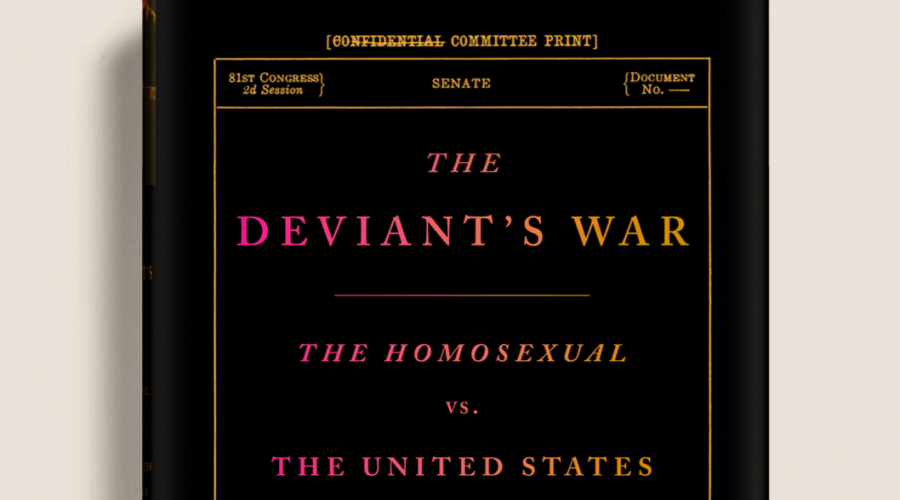
Eric Cervini's first book has already joined the New York Times' Best Seller list, the first LGBTQ+ history book to make it to the list in 27 years.
I hope the book inspires other people, especially students, to become interested in telling other LGBTQ+ stories from the past.
Eric Cervini
Eric Cervini’s first book The Deviant’s War: the Homosexual vs the United States of America was published earlier this month – Gay Pride Month – and has already won much praise and become a bestseller. George Chauncey described in The New York Times Book Review said it was “exhaustively researched and vividly written” and was a “riveting account of Kameny’s struggle will be eye-opening for anyone keen to have a crash course on LGBTQ. politics”.
In the book, Eric [2015], who did his PhD in History, tells the story of Frank Kameny, a rising astronomer working for the US Defense Department in Hawaii, who was dismissed from his government job in 1957 for being gay. Unlike many others, though, Kameny fought back. Based on first hand accounts, recently declassified FBI records and 40,000 personal documents, Eric’s book charts how, over the course of the 1960s, the Mattachine Society of Washington, the group Kameny founded, became the first organisation to protest the systematic persecution of gay federal employees. In so doing it traces the forgotten ties that bound gay rights to the Black Freedom Movement, the New Left, lesbian activism and trans resistance. We asked him about the writing process, why the book matters and what he plans to do next.
Question: Is the book wholly based on your PhD?
Eric Cervini: The book is the culmination of my undergraduate thesis, my MPhil dissertation and my PhD dissertation. I applied to the Gates Cambridge scholarship with the goal of writing a book on this specific topic, and five years later, it’s finally published!
Question: How much was known about this period in gay rights history before?
Eric: There are great histories of the pre-Stonewall “homophile” movement, but there wasn’t yet a book solely about Frank Kameny, the grandfather of the gay rights movement, and his organisation, the Mattachine Society of Washington. I wrote The Deviant’s War with a focus on just one decade, the 1960s, so that I could achieve as much depth as possible as I explored the complex, dramatic and interconnected lives of the figures in the book.
Question: How widely known was Kameny’s story?
Eric: His story is well known within academia and in Washington, D.C., but the vast majority of the LGBTQ+ community doesn’t know his name. It’s my goal to make his story as familiar as that of other American historical icons, from Dr King to Betty Friedan.
Question: What were some of the most surprising things you found out during your research for the book?
Eric: My MPhil dissertation focused on the Federal Bureau of Investigation’s infiltration and surveillance of the pre-Stonewall gay rights movement. The extent to which FBI Director J. Edgar Hoover was preoccupied with the activities of these early gay activists was shocking.
Question: What is your hope for the book?
Eric: I hope it inspires other people, especially students, to become interested in telling other LGBTQ+ stories from the past. There are so many books that still need to be written about the activists who fought for the rights we have today, and I hope the stories of some of the secondary characters in my book provokes writers or scholars to write books about them.
Question: Why is it important?
Eric: In America, the LGBTQ+ community is under attack once again, and the story of activism in the 1960s proves that organised and persistent resistance actually works. We have so much to learn from the past – how we need to protect the most marginalised people in our community, including trans people of colour – as we continue fighting today.
Question: It seems to be attracting a lot of attention. What has the response been so far?
Eric: I have been overwhelmed with support and interest in the book. The Deviant’s War was the first LGBTQ+ history book to appear on the New York Times Best Sellers List in 27 years, and I hope it proves to the publishing industry that there is significant demand for more hidden histories of the LGBTQ+ world.
Question: Have you been working on it since you left Cambridge and what do you plan to do next?
Eric: I worked on it nonstop after Cambridge, and now I have a few other projects in the pipeline! I’m especially excited about elevating other historians’ research and voices through social media and television. Stay tuned!

Eric Cervini
- Alumni
- United States
- 2015 PhD History
- Emmanuel College
Originally from Austin, Texas, I became interested in politics and public policy early; before Harvard, I worked on the election campaigns of several Texas politicians and at the Texas headquarters during the first Obama presidential campaign. I spent college summers interning at the Democratic Governors Association, the Clinton Foundation, and researching at Cambridge. In addition to leading a seminar for local high school students in Shanghai and acting as the editor-in-chief of the Harvard Undergraduate Law Review, I joined Harvard Model Congress as a freshman, and in my senior year, I was HMC's co-president and CEO. I taught high school students at HMC conferences in Boston, Singapore, Brussels, Madrid, San Francisco and Hong Kong, and I founded and led HMC Dubai, the first government simulation in the Middle East. For my MPhil, I attended Emmanuel College, Cambridge as the Harvard Scholar, and my PhD dissertation will investigate the American homophile movement in the 1960s. Above all, I’m grateful and excited to join the Gates Cambridge family!
Previous Education
Harvard University
University of Cambridge












